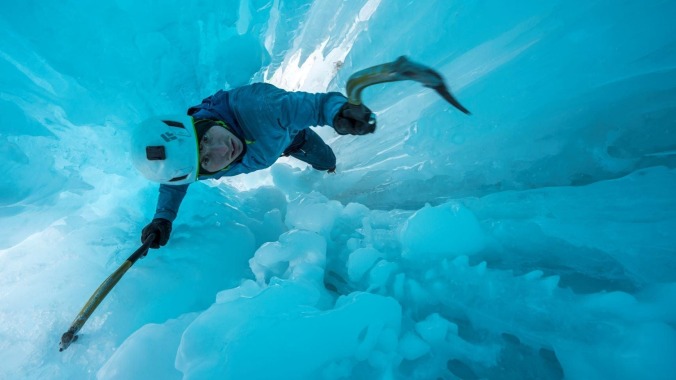Mountain-climbing doc The Alpinist is stunning—when the subject lets the directors shoot
Canadian climber Marc-André Leclerc doesn’t exactly facilitate the movie made about him

Visually spectacular documentaries about mountain climbers seem to arrive regularly these days, perhaps because technological advances have made it easier for a camera crew to get where it needs to be. The films made by Jimmy Chin and Elizabeth Chai Vasarhelyi in particular have grabbed the public imagination, with Free Solo even winning the Best Documentary Feature Oscar two years ago. So the first question about The Alpinist, a portrait of Canadian climber Marc-André Leclerc, is whether another such movie has anything to add, or if it will just be same rock, different dude. (Alex Honnold, the subject of Free Solo, is among the talking heads here.) As it happens, this account is unique in a couple of respects: one very sad, and the other immensely frustrating. In essence, The Alpinist is a movie about someone who doesn’t particularly want to be in a movie—or at least doesn’t care whether or not the movie gets made.
To some degree, that’s what’s interesting about Leclerc, who’s not at all a charismatic chatterbox like Honnold. His girlfriend, fellow climber Brette Harrington, loving describes him as socially awkward, though “iconoclast” might be le mot juste; we hear stories about him living for months at the bottom of a stairwell (with Brette, eventually!), and he seems to emerge from out of nowhere in the climbing world, performing remarkable ascents with virtually no publicity—initially, not even with much notice from his peers. For Leclerc, scaling difficult peaks is its own reward, irrespective of whether anyone else knows that he did it. Still, that degree of talent couldn’t stay hidden forever. Other climbers speak of his exploits with awe, marveling at his ability to navigate every kind of terrain, and to shift back and forth between rock and ice in winter climbs that almost nobody else even attempts. (This entails constantly changing your shoes.) Before long, he’s gearing up to tackle some of the globe’s most treacherous peaks.
Here’s the problem for directors Peter Mortimer (who also narrates) and Nick Rosen, though: Leclerc doesn’t want a camera crew with him. Despite having agreed to take part in the project, it appears as if he never thought through what that would entail. You can’t truly “solo,” after all, with other people observing your progress from a few feet away the whole time—it’s a bit like inviting somebody to hang out with you in an isolation tank. Consequently, at a certain point in the film, Leclerc flat-out ghosts the filmmakers, ignoring their phone calls and telling them nothing about what he’s doing. On the one hand, it’s amusing to watch them gnash their teeth as they learn about their subject’s continuing adventures via other climbers’ social-media accounts. On the other (and far more important) hand, though, Leclerc’s most notable climbs don’t get filmed at all. After a while, he relents a little and agrees to let a friend and fellow alpinist accompany him to shoot footage, and even to carry a camera himself. Nevertheless, his efforts to reach the summit of Torre Egger in Patagonia barely get chronicled, with Leclerc apparently having only remembered to turn the camera on twice during his second, successful ascent—once to capture a lovely sunset over his shoulder, and then again when he’s already atop the mountain, celebrating his victory.
Truth be told, there’s something admirable about the sheer lack of fucks that Leclerc has to give, which reflects the purity of his love for climbing rather than mere punk attitude (even if we do get a random Gang Of Four needle drop at one point). And it’s not as if The Alpinist is devoid of rock-scaling thrills and majesty, since Leclerc does let the directors tag along for climbs he considers relatively unimportant. He even performs one ascent expressly for the camera, after having insisted on doing it alone the first time. Still, this is a movie, not a book or feature article. And having a subject who largely refuses to cooperate, thereby forcing the filmmakers to sit around at home and relate much of what happens indirectly, doesn’t exactly make for a classic. The best that can be said is that Leclerc’s partial absence paves the way for a tragic epilogue (which anyone who looks him up will immediately learn, and most of you can probably guess, though the film withholds that information until the very end). The film ultimately becomes an ardent tribute to a young man whose desire to be observed and celebrated was all but nonexistent.